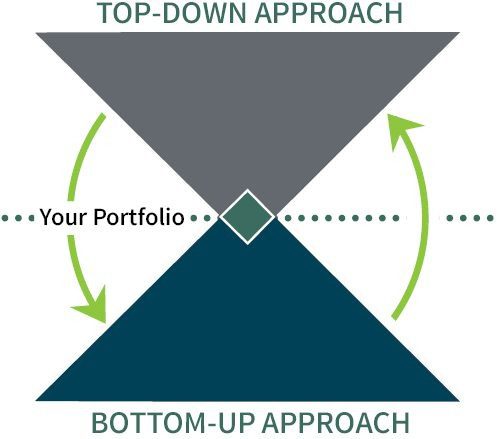
GOAL-ORIENTED INVESTMENT MANAGEMENT
We offer a goal-oriented investment management philosophy. Our portfolios are carefully designed to each client’s unique situation and use individual stocks and bonds for greater control. By hand-selecting stocks and bonds for each portfolio, we can strategically plan the timing and magnitude of capital gains. In addition, we are better able to project future income.
Our team develops your portfolio using a combination of our investment management strategies and bases it on the following:
- Goals and objectives for both yourself and your family
- Your risk tolerance
- Expectations for capital growth and need for income
WHAT TO EXPECT WITH OUR INVESTMENT MANAGEMENT SERVICES?
- Risk-averse investing focused on achieving your long-term goals
- Investment decisions that draw on over 40 years of experience navigating complex markets
- A diversified portfolio of individual stocks and bonds crafted to meet your growth and income needs
- A long-term investment approach with a focus on owning good companies, rather than just good stocks
- A selection process that considers both the macro-environment (big picture) as well as a fundamental analysis of each company
HOW DO WE SELECT SECURITIES?
Our approach uses both “top-down” and “bottom-up” analyses. This provides a view of the bigger picture as well as detailed analysis into the individual securities considered for each portfolio. Only companies that satisfy requirements for both our top-down and bottom-up analyses are considered for inclusion. For additional details, click the “learn more” link under the how we select securities section below.
CAN WE CUSTOMIZE PORTFOLIOS TO YOUR PERSONAL SITUATION?
Our Advisors use information gathered from client meetings, goal discussions, risk tolerance questionnaires, and financial plans to develop individualized, goal-oriented, and balanced investment portfolios. Each portfolio consists of a mix of different investment strategies that range from higher risk to little-to-no risk. In addition, our advisors customize necessary elements of our investment management process to each client’s particular situation. Ways in which we customize portfolios include:
- TAX-SENSITIVE INVESTING: We can spread a sizable taxable event over multiple years to reduce an individual’s total multi-year tax burden. In addition, we can help avoid important tax triggers that may have an outsized effect on overall finances.
- LEGACY POSITIONS & RESTRICTED COMPANIES: This may include holding a position in a company not included in our investment strategies or intentionally not investing in specific companies for reasons personal to the client.
- OTHER: Our process allows us to work within various investment constraints.
Questions?
Please let us know if you have any questions about our firm or our services. One of our Wealth Management Advisors would be happy to assist you.
How We Select Securities

TOP-DOWN APPROACH
Our top-down approach analyzes and provides an overview of the macro-economic environment, or the broad economy. This includes trends in overall global economic growth, employment, inflation, and more. Once complete, this analysis is used to determine sector allocation within our investment management strategies.
BOTTOM-UP APPROACH
Our bottom-up approach looks at individual securities (stocks and bonds) in detail. We carefully compare each security or company to its sector and competitors. As a part of our analysis, we consider the company’s financial situation, management team, business strategy, ability to adapt, and track record.
Simplify your finances.
Articles Related to Investment Management
Should I be concerned about the presidential election’s impact on the market?
S&P 500 Return During Presidential Election Years Policy uncertainty is predictably at its peak during election years. If there is one thing the stock market hates, it is uncertainty. However, a review of historical data shows little correlation between national…
How are my capital gains taxed?
Tax returns are complicated. To add to their complexity, investment income generated by stocks, bonds, and other investment assets may be taxed differently than your other sources of income. Investment income includes capital gains and losses. WHAT ARE CAPITAL GAINS…
Is now a good time to buy gold?
Gold has long been a popular choice for investors seeking stability and diversification in their portfolios as the commodity has historically been used to hedge against economic uncertainty and geopolitical risks. In addition to being a long-time symbol of wealth,…
Should I be worried about the Silicon Valley Bank collapse?
The fall of major banks like Silicon Valley Bank, Signature Bank, and Credit Suisse have rightly spooked investors and raised questions about the relative health and sustainability of the banking sector as a whole. In the media, these failures have…
Should I sell a stock when the price declines?
SHOULD I SELL A STOCK WITH A DECLINE IN PRICE Deciding whether to sell or hold a stock can be one of the most difficult and important aspects of investing in equity markets, as our emotions can work against our…
Why is an economic soft landing so difficult to achieve?
A soft landing is achieved when an economy moves from a growth period in a business cycle to that of slow growth, or no growth, while avoiding a recession. In the U.S., hard and soft landings generally occur after a…
What are the benefits of individual bonds over bond mutual funds when investing in fixed income?
There are unique risks and benefits to investing in either individual bonds or in bond mutual funds. We have detailed a few of these risks and benefits below. Price Stability of Individual Bonds vs. Mutual Funds When buying an individual…
How can I help my children / grandchildren start investing?
As a parent or grandparent, you want to help guide your loved ones towards a path of success. Teaching them about compound interest and the importance of investing early in life will help guide them down the right track to…
Should I consider investing in U.S. Treasury Series I Bonds?
Interest rates remain at historically low levels. While we expect the Federal Reserve to start a path toward higher interest rates in March, we are also experiencing high inflation. This can put a strain on those focused on generating current…
What is the role of dividend-paying stocks in a portfolio?
In our last Q&A, we discussed the role of fixed income (or bonds) in a balanced portfolio. Continuing on the topic of balanced portfolios, dividend-paying stocks also play a key role in balanced portfolios, providing sector and industry diversification. BENEFITS…









